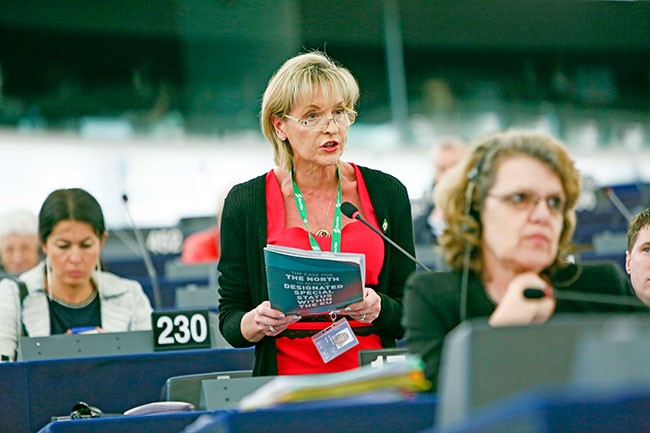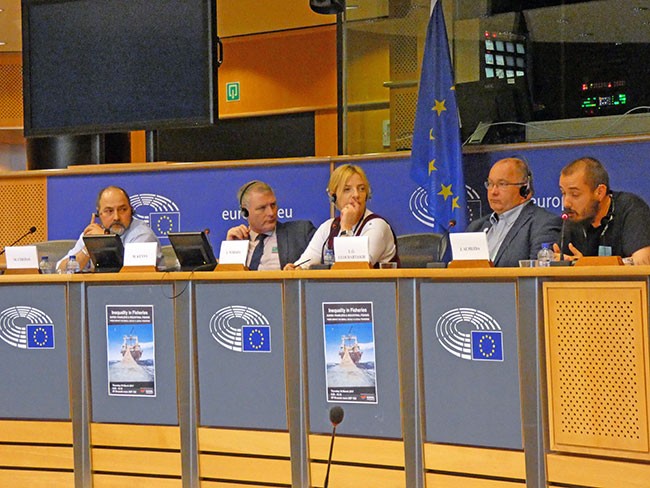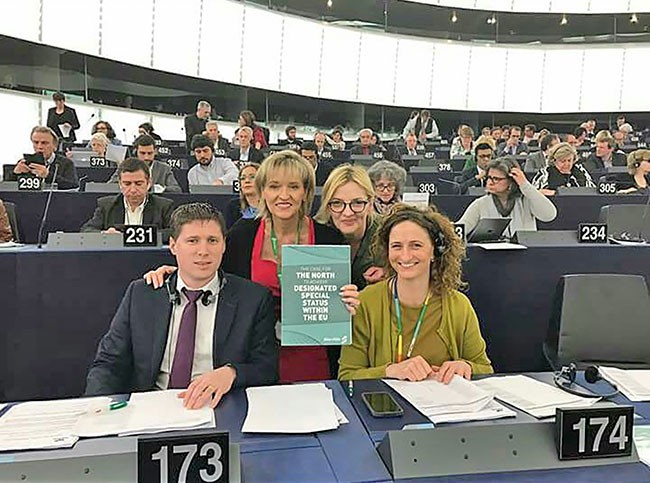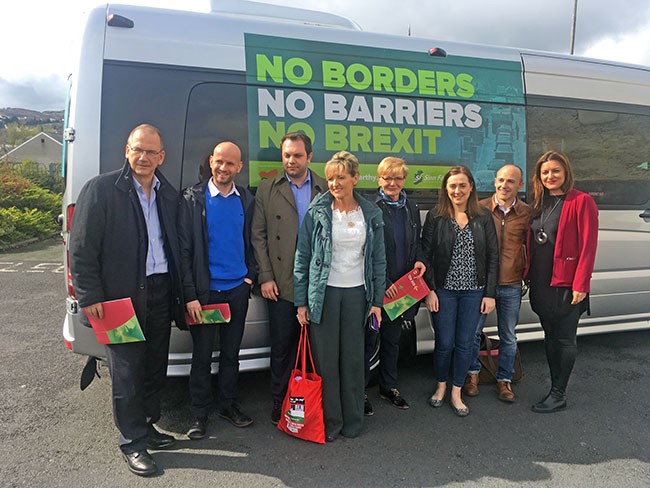2 May 2017 Edition
Another Europe is possible – Treo eile don Eoraip
Funded by the European United Left/ Nordic Green Left (GUE/NGL)

Funded by the European United Left / Nordic Green Left (GUE/NGL) Aontas Clé na hEorpa / Na Glasaigh Chlé Nordacha Crúpa Paliminta – Parlaimimt na h Eorpa
Majority of MEPs acknowledge ‘special circumstances’ of Ireland in Brexit Euro Parliament debate

• GUE/NGL’s Brexit Co-ordinator, Ireland North MEP Martina Anderson
IN the European Parliament on 5 April, 516 of the 699 MEPs present voted in favour of a resolution on Brexit negotiations with Britain which outlined the EU’s commitment to the Peace Process and opposition to a hard Border.
The resolution reads that the EU “recognises the unique position and special circumstances confronting the island of Ireland” and is “especially concerned at the consequences” of Brexit for Ireland.
It “insists on the absolute need to ensure continuity and stability of the Peace Process” and it will “do everything possible to avoid a hardening of the Border”.
During the debate, GUE/NGL President Gabi Zimmer assessed the impact Britain’s exit from the EU would have and what must be done. She said “the rights of the EU citizens who reside in the UK, and UK citizens in the EU and the North of Ireland, must be guaranteed”.
“Now, in the 21st century, we cannot allow a hard Border to emerge in the EU.
“I never want to see walls and fences going up again inside the EU,” the German MEP said.
GUE/NGL’s Brexit co-ordinator, Martina Anderson MEP, evoked the memories of the late deputy First Minister in the North of Ireland, Martin McGuinness, by telling the European Parliament plenary:
“Martin McGuinness met with virtually every signatory of the joint resolution and asked three things from you: that you preserve the Good Friday Agreement in all its parts; that there would be no hardening of the Irish Border; and the unique circumstances and special status of Ireland would be supported.
“This is why we associate ourselves with this resolution. We feel now that the European Parliament is a partner to the people of the North of Ireland.”
The Ireland North MEP added:
“Despite the fact that we support the joint resolution, we all have to recognise that this is not the Europe we want or that the people need. We need an open and critical debate on the future of Europe – something that the resolution also calls for.
“Together we can shape a better Europe, a more social Europe and a more democratic Europe - a Europe of Equals.
“To the European Council I’d say – it’s over to you.”
Fisheries conference hosted by Liadh Ní Riada

• MEP Liadh Ní Riada chairs the conference discussion 'Socio-Economic Consequences on Local Fishing and Coastal Communities and the Case for Small-Scale Fisheries' with panellists Martin Kenny TD (Sligo/Leitrim), Senator Trevor Ó Clochartaigh (Galway), João Almeida of the Union of Northern Fishworkers and Fisheries Trade Unions Federation, and Manuel Chedas, a fisherman from the small trawler sector
IRELAND SOUTH MEP Liadh Ní Riada has warned that small Irish coastal communities will soon become little more than “open-air museums” unless action is taken to safeguard smaller fishing fleets and invest in their growth.
She made the claim at a conference she hosted in the European Parliament at the very end of March under the title 'Inequality in Fisheries'.
MEPs from across Europe joined Liadh along with representatives from the Irish and European fishing industries, as well as Martin Kenny TD, Senator Rose Conway and Senator Trevor Ó Clochartaigh to discuss the crisis facing small-scale fishing communities.
Among the issues discussed was the havoc being wreaked on the Irish industry by factory ships and “super trawlers” which Liadh Ni Riada, who sits on the EU Fisheries Committee, described as “floating factories of destruction, environmental decay and symbols of corporate interference and all that is wrong with the quota system”.
The Ireland South MEP said:
“They have nets larger than Croke Park, which trawl continuously, hoovering up everything they come into contact with, including dolphins, sharks and all manner of marine life. They then discard less-valuable fish in favour of the more profititable catch.
“If indigenous fishing industries are to have any hope of surviving then International Transferable Quotas and relative stability have to be reviewed.”
At the moment, the Irish industry is only processing around 5% of total catch in Irish waters, she said.
“Vessels who land all their Atlantic catches in Irish waters should have to process in Ireland.”
Left should lead visible campaign for rejection of Fiscal Compact
MEP Matt Carthy has called on the Left in Ireland and across the EU to develop a visible campaign for the rejection of the Fiscal Compact in anticipation of the scheduled Council vote on whether or not to incorporate the Fiscal Compact into the EU Treaty at the end of this year. The vote has to be unanimous.
Matt Carthy is a member of the European Parliament’s Economic & Monetary Affairs Committee.
Speaking in a debate on the Economic and Monetary Union in Strasbourg hosted by GUE/NGL, the Ireland North West MEP said:
“In my view, Brexit poses not only risks but opportunities when it comes to creating impetus for fundamental change in macroeconomic governance and policy in the EU.”
He said that we are starting to see some cracks in the pro-austerity position of the EU elite since the Brexit vote, in addition to the broader soul-searching going on among social democrats and conservatives.
“We had the statement from the Commission last November urging a ‘positive euro area fiscal stance’ and the unusual backdown, to a certain extent, on sanctions on Portugal and Spain over excessive deficits.
“We’ve also seen important shifts in the once-unshakeable ideology of the elite in Europe and internationally with organisations such as the IMF, for example, questioning neoliberalism.”
He continued:
“The Fiscal Compact, which tightened the straitjacket of the Stability and Growth Pact in 2011, has been an unmitigated disaster.
“In the Irish state it poses a major obstacle to an effective resolution to deep crises in housing, homelessness and health – in addition, of course, to the utter lack of political will to resolve these problems on the Government’s side.
“At the end of this year, the Council will have to vote on whether or not to incorporate the Fiscal Compact into the EU Treaty or not.
“As a very minimal demand, the Left should lead a campaign against the Fiscal Compact being made permanent and incorporated into the Treaty.
“A rejection by one or more states would have a significant political impact in promoting the debate about the dead-end of austerity and developing an alternative macroeconomic framework.”

• MEPs Matt Carthy, Martina Anderson, Liadh Ní Riada and Lynn Boylan in the European Parliament with 'The Case for the North to Achieve Special Designated Status Within the EU'
Young people ‘marginalised by punitive policies’
THE FAILURE of EU projects such as the Youth Guarantee and the punitive measures of successive Irish governments are destroying the lives of young people, Dublin MEP Lynn Boylan has said.
Lynn, who is a substitute member of the European Parliament’s Committee on Employment and Social Affairs, said that the inability of the EU to successfully roll out projects such as the Youth Guarantee in conjunction with member states has left young people in an extremely precarious position.
“There is insurmountable evidence that, since the beginning of the financial crisis, young people have been indiscriminately attacked through punitive policy measures and left in an extremely marginalised position.
“A cursory glance at the difficulties they face reveals such marginalisation. Young people are over twice as likely to be unemployed than the national average. They have suffered welfare discrimination because of their age and they have emigrated in higher numbers than any other age group.”
People under 34 in Ireland “currently face the worst life prospects in generations”, the Dublin MEP said.
GUE/NGL MEPs’ fact-finding visit to Ireland

A ‘TASK FORCE’ of GUE/NGL MEPs from across Europe visited Ireland at the end of March to see the impact of Brexit at first hand.
The MEPs were on a two-day fact-finding mission organised by Irish MEPs Martina Anderson and Matt Carthy.
The MEPs making up the task force included Gabi Zimmer (President of the GUE/NGL Group), Marisa Matias from Portugal, Josu Jurasti from the Basque Country, Lidia Senra from Galicia, and Giorgios Karatsioubanis, a representative of SYRIZA from Greece.
Following their arrival at Dublin Airport, they travelled north in a minibus emblazoned with the message “No Border, No Barriers, No Brexit” for a series of meetings on both sides of the Border.
The group met with representatives of Newry, Mourne & Down District Council in Newry itself alongside local business and civic leader before travelling to Carrickmacross on the other side of the Border to meet members of Monaghan County Council and local business and agricultural representatives.
At both meetings they heard how the imposition of a hard border by the British Government against the democratic will of the people of the North would devastate local communities.
On the Friday, the delegation travelled to Belfast to meet community groups before meeting MLAs at Stormont Parliament Buildings.
Financial Framework Review ‘missed opportunity’
LIADH NÍ RIADA has described the Multi Annual Financial Framework Review (MFF) voted on in Strasbourg at the start of April as “a missed opportunity”.
The MFF sets a seven-year budget that cannot be exceeded.
The Ireland South MEP said the review could have been a catalyst for real change in the Parliament and could have heralded a return to the social partnership the European Union was originally intended to be.
“What was needed in this review was a sea change in priorities and this has not happened,” she said.
She said that youth unemployment is still a huge issue across Europe.
“Disenchantment from young people towards the European institutions is growing because Europe is not doing what it was set up to do – provide a platform for social progress.
“Given the recent toxic Brexit vote, this review was a chance to take stock and address the real fears that people have about the EU.
“If we are going to build a better Europe, then a different road needs to be taken. Political leadership and courage is needed to direct us towards a Europe that will deliver for all of its people – a Europe that will deliver real social progress in areas of health, housing education and employment.
“This is the purpose that the EU was set up for. Instead it has become a vehicle to serve big business first and people second. It sees increased spending on borders, military and security while social programmes are cut.
“This is wrong, it must end and people’s faith in Europe must be restored.”


